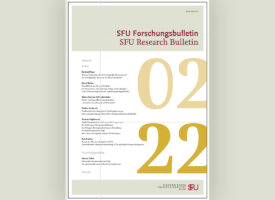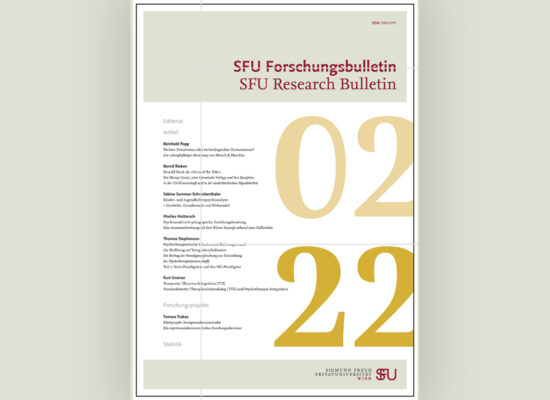Dear Readers!
This issue of the SFU Research Bulletin is a special one – it is the last time the journal will appear in this form in its 10th year.
Fortunately, however, it is not being discontinued – rather, it is undergoing a transformation and, according to the plans of the new editorial team, will appear in a different form in 2023. A “rebrushing” of some technical and optical aspects of an online publication medium after ten years of publication is probably a good idea anyway, and the change in the editorial board, which took place in 2022, provided a concrete impetus for this. However, an improvement of the journal’s “visibility” in the scientific community – which has not been very high outside of Austria so far – could hardly be achieved with layout changes alone. For this reason, and at the same time to emphasise the focus on the field of psychotherapy science, the journal will also be given a new title from next year:
“Austrian Journal for Psychotherapy Science (AJPTS)” / “Österreichische Zeitschrift für Psychotherapiewissenschaft (ÖZPTW)”.
While the journal title has been bilingual up to now, in future the consistent orientation towards bilingual issues will take account of the continuing strong trend towards internationalisation, especially in the field of literature databases, scientific evaluation, etc.: contributions can still be submitted in both languages. Contributions can still be published in German. In addition, however, English-language contributions will also be published, whereby the information required for reference in citation databases (abstract keywords) will always be provided in both languages.
With regard to the form of publication as an open access online journal, the AJPTS will remain true to the tradition of the SFU research Bulletin; however, an important innovation concerns the review process: while this has been organised as a double blind peer review in line with the mainstream of science publishing in recent decades, in future this will be abandoned in favour of an open peer review.
In the opinion of the editorial team, the latter offers the former significant advantages, including in particular the transparency of decisions on all sides and the encouragement of collaboration between authors and reviewers instead of the virtual impossibility of such collaboration in the context of the artificial communication situation of “double blind review”.
In the form of a “triple open peer review” (open identity, open communication, open report) that we envisage, the identities of all participants will also be revealed to the readers, and at the same time a limitation of the participation of institution-internal reviewers will be ensured.
In this context, the new journal will also – following a very welcome trend – differentiate more clearly than before between different types of publication, depending on the scientific claim to innovation. More details on this can be found in the author guidelines pre-published as an appendix to this issue.
The thematic orientation remains unchanged: contributions on all areas of psychotherapy science and psychology, as well as related disciplines, continue to be welcome. The frequency of publication will also remain the same, with two issues per year, but after careful consideration and in-depth discussions we have decided to move the publication dates from June/December to March/September – the reasons for this are essentially pragmatic and relate to the “deadline run” in the review process:
Based on the assumption that in open review mode this can usually be completed within a month, the two publication dates at the end of March and the end of September result in 15.01. and 15.07. of each year as deadlines for manuscript submissions for the next issue – two dates which are situated in the usual academic year in this country in such a way that they allow at least some ‘breathing space’ for final writing spurts during the time when there are no lectures.
With such adaptations, we hope to be able to motivate potential authors to submit contributions to the discourse in psychotherapy science in the future – please make use of this offer, if possible, already in 2023! As in the past, submissions will be made via the journal’s online portal. You can now access it directly at the following web address: https://journals.sfu.ac.at/index.php/ajps/index
So much for the preview of the future development of the journal. At this point it should be noted that, fortunately, several innovative and insightful contributions were received for this “farewell issue” of the Research Bulletin, in various publication formats,
have been received.
On behalf of the editorial team, have a great read!
Priv.-Doz. Mag. Dr. Carlos Watzka (E-Mail) & Univ. Ass. Mag. Maria Gren (E-Mail)
Sigmund Freud University Vienna

